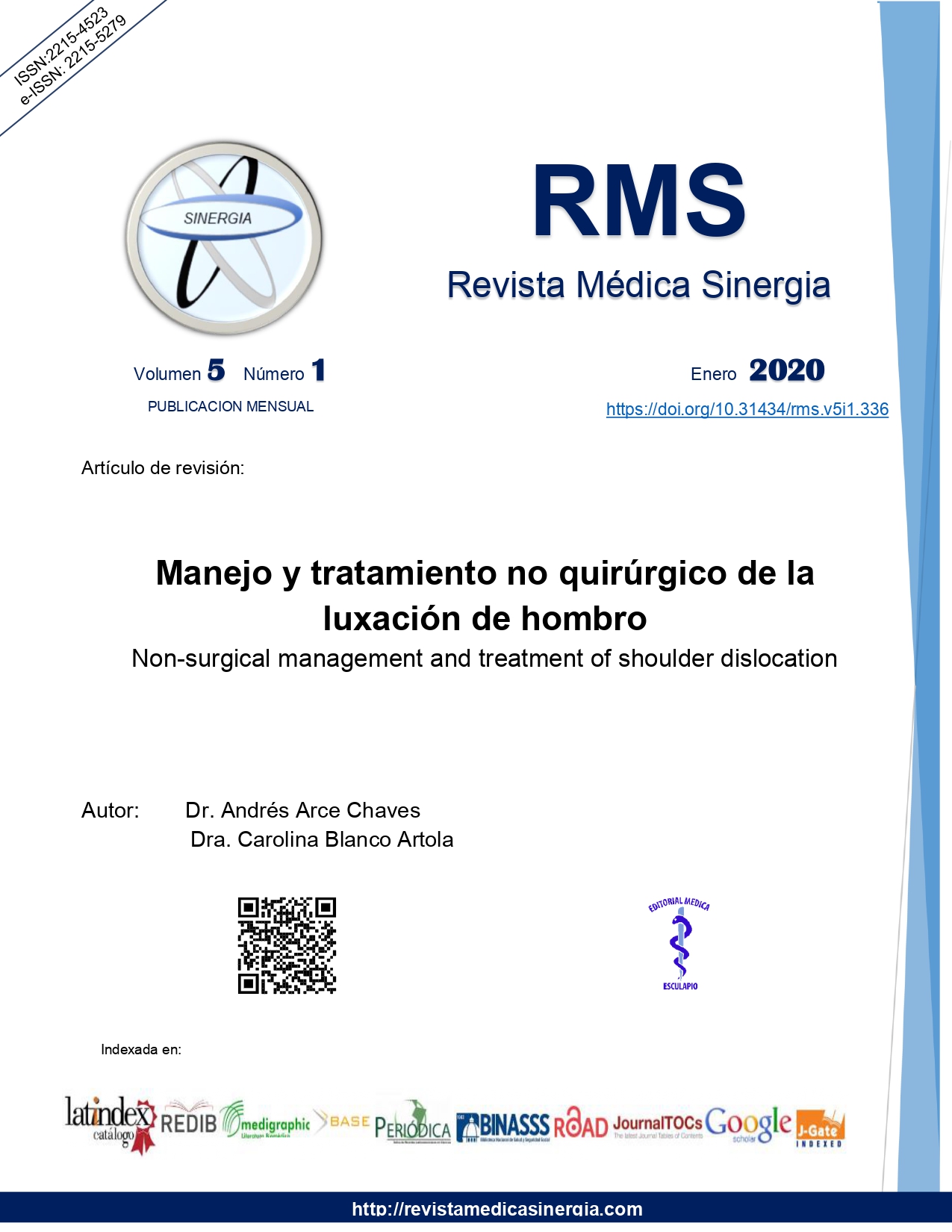Resumen
El hombro es la articulación que más frecuentemente se luxa en el cuerpo humano. El tipo de luxación más común es la anterior, seguido de la posterior, mientras que la luxación inferior es la menos frecuente. Uno de los mecanismos más frecuentes de la luxación anterior es un traumatismo indirecto sobre el miembro superior con el hombro en abducción, extensión y rotación externa. Las caídas, convulsiones, y accidentes automovilísticos son los más frecuentes. El manejo inicial es funcional en la mayoría de los casos
Palabras clave
Citas
Hasebroock AW, Brinkman J, Foster L, Bowens JP. Management of primary anterior shoulder dislocations: a narrative review. Sports Medicine - Open. 2019 07 11;5(1). https://doi.org/10.1186/s40798-019-0203-2
Aydin N, Enes Kayaalp M, Asansu M, Karaismailoglu B. Treatment options for locked posterior shoulder dislocations and clinical outcomes. EFORT Open Reviews. 2019 05;4(5):194-200. https://doi.org/10.1302/2058-5241.4.180043
Kokkalis ZT, Iliopoulos ID, Antoniou G, Antoniadou T, Mavrogenis AF, Panagiotopoulos E. Posterior shoulder fracture-dislocation: an update with treatment algorithm. European Journal of Orthopaedic Surgery & Traumatology. 2016;27(3):285-94. https://doi.org/10.1007/s00590-016-1840-5
Alkaduhimi H, Linde JVD, Flipsen M, Deurzen DV, Bekerom MVD. A systematic and technical guide on how to reduce a shoulder dislocation. Turkish Journal of Emergency Medicine. 2016;16(4):155-68. https://doi.org/10.1016/j.tjem.2016.09.008
Olds M, Ellis R, Donaldson K, Parmar P, Kersten P. Risk factors which predispose first-time traumatic anterior shoulder dislocations to recurrent instability in adults: a systematic review and meta-analysis. British Journal of Sports Medicine. 2015;49(14):913-22. https://doi.org/10.1136/bjsports-2014-094342
Khiami F, Gérometta A, Loriaut P. Management of recent first-time anterior shoulder dislocations. Orthopaedics & Traumatology: Surgery & Research. 2015 02;101(1):S51- S57. https://doi.org/10.1016/j.otsr.2014.06.027
Hendey GW. Managing Anterior Shoulder Dislocation. Annals of Emergency Medicine. 2016;67(1):76-80. https://doi.org/10.1016/j.annemergmed.2015.07.496
Gonai S, Kamio Y, Matsuoka T, Harunari M, Saito Y, Takuma K. A new autoreduction method for anterior shoulder dislocation: the GONAIS method. The American Journal of Emergency Medicine. 2016;34(1). https://doi.org/10.1016/j.ajem.2015.05.053
Sapkota K. Comparison Between External Rotation Method and Milch Method For Reduction of Acute Anterior Dislocation of Shoulder. Journal Of Clinical And Diagnostic Research. 2015; https://doi.org/10.7860/JCDR/2015/11850.5738
Ketenci IE, Duymus TM, Ulusoy A, Yanik HS, Mutlu S, Durakbasa MO. Bilateral posterior shoulder dislocation after electrical shock: A case report. Annals of Medicine and Surgery. 2015 Dec;4(4):417-421. https://doi.org/10.1016/j.amsu.2015.10.010
Prasathaporn N, Laohathaimongkol T, Umprai V, Kuptniratsaikul V. Arthroscopically Assisted Reduction in a Chronic Locked Posterior Shoulder Dislocation. Arthroscopy Techniques. 2019;8(7). https://doi.org/10.1016/j.eats.2019.03.015
Khira YM, Salama AM. Treatment of Locked Posterior Shoulder Dislocation With Bone Defect. Orthopedics. 2017 03 15;40(3):e501-e505. https://doi.org/10.3928/01477447-20170308-07
Kokkalis ZT, Iliopoulos ID, Antoniou G, Antoniadou T, Mavrogenis AF, Panagiotopoulos E. Posterior shoulder fracture–dislocation: an update with treatment algorithm. European Journal of Orthopaedic Surgery & Traumatology. 2016 08 25;27(3):285-294. https://doi.org/10.1007/s00590-016-1840-5
Kammel KR, Leber EH. Posterior Shoulder Dislocations. [Updated 2019 May 6]. In: StatPearls [Internet]. Treasure Island (FL): StatPearls Publishing; 2019 Jan-. Available from: https://www.ncbi.nlm.nih.gov/books/NBK441919/
Kitagawa T, Matsui N, Nakaizumi D. Impact of combination of therapeutic exercise and psychological intervention for a patient with first-time traumatic shoulder dislocation. Journal of Physical Therapy Science. 2019;31(10):850-4. https://doi.org/10.1589/jpts.31.850


